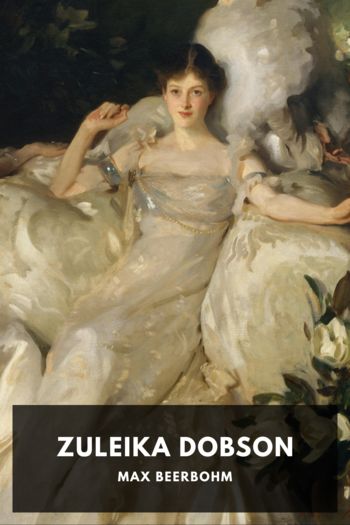Zuleika Dobson - Max Beerbohm (good e books to read txt) 📗

- Author: Max Beerbohm
Book online «Zuleika Dobson - Max Beerbohm (good e books to read txt) 📗». Author Max Beerbohm
“She did not look like an orphan,” said the wife of the Oriel don, subsequently, on the way home. The criticism was a just one. Zuleika would have looked singular in one of those lowly double-files of straw-bonnets and drab cloaks which are so steadying a feature of our social system. Tall and lissom, she was sheathed from the bosom downwards in flamingo silk, and she was liberally festooned with emeralds. Her dark hair was not even strained back from her forehead and behind her ears, as an orphan’s should be. Parted somewhere at the side, it fell in an avalanche of curls upon one eyebrow. From her right ear drooped heavily a black pearl, from her left a pink; and their difference gave an odd, bewildering witchery to the little face between.
Was the young Duke bewitched? Instantly, utterly. But none could have guessed as much from his cold stare, his easy and impassive bow. Throughout dinner, none guessed that his shirtfront was but the screen of a fierce warfare waged between pride and passion. Zuleika, at the foot of the table, fondly supposed him indifferent to her. Though he sat on her right, not one word or glance would he give her. All his conversation was addressed to the unassuming lady who sat on his other side, next to the Warden. Her he edified and flustered beyond measure by his insistent courtesy. Her husband, alone on the other side of the table, was mortified by his utter failure to engage Zuleika in small-talk. Zuleika was sitting with her profile turned to him—the profile with the pink pearl—and was gazing full at the young Duke. She was hardly more affable than a cameo. “Yes,” “No,” “I don’t know,” were the only answers she would vouchsafe to his questions. A vague “Oh really?” was all he got for his timid little offerings of information. In vain he started the topic of modern conjuring-tricks as compared with the conjuring-tricks performed by the ancient Egyptians. Zuleika did not even say “Oh really?” when he told her about the metamorphosis of the bulls in the Temple of Osiris. He primed himself with a glass of sherry, cleared his throat. “And what,” he asked, with a note of firmness, “did you think of our cousins across the water?” Zuleika said “Yes;” and then he gave in. Nor was she conscious that he ceased talking to her. At intervals throughout the rest of dinner, she murmured “Yes,” and “No,” and “Oh really?” though the poor little don was now listening silently to the Duke and the Warden.
She was in a trance of sheer happiness. At last, she thought, her hope was fulfilled—that hope which, although she had seldom remembered it in the joy of her constant triumphs, had been always lurking in her, lying near to her heart and chafing her, like the shift of sackcloth which that young brilliant girl, loved and lost of Giacopone di Todi, wore always in secret submission to her own soul, under the fair soft robes and the rubies men saw on her. At last, here was the youth who would not bow down to her; whom, looking up to him, she could adore. She ate and drank automatically, never taking her gaze from him. She felt not one touch of pique at his behaviour. She was tremulous with a joy that was new to her, greater than any joy she had known. Her soul was as a flower in its opetide. She was in love. Rapt, she studied every lineament of the pale and perfect face—the brow from which bronze-coloured hair rose in tiers of burnished ripples; the large steel-coloured eyes, with their carven lids; the carven nose, and the plastic lips. She noted how long and slim were his fingers, and how slender his wrists. She noted the glint cast by the candles upon his shirtfront. The two large white pearls there seemed to her symbols of his nature. They were like two moons: cold, remote, radiant. Even when she gazed at the Duke’s face, she was aware of them in her vision.
Nor was the Duke unconscious, as he seemed to be, of her scrutiny. Though he kept his head averse, he knew that always her eyes were watching him. Obliquely, he saw them; saw, too, the contour of the face, and the black pearl and the pink; could not blind himself, try as he would. And he knew that he was in love.
Like Zuleika herself, this young Duke was in love for the first time. Wooed though he had been by almost as many maidens as she by youths, his heart, like hers, had remained cold. But he had never felt, as she had, the desire to love. He was not now rejoicing, as she was, in the sensation of first love; nay, he was furiously mortified by it, and struggled with all his might against it. He had always fancied himself secure against any so vulgar peril; always fancied that by him at least, the proud old motto of his family—“Pas si bête”—would not be belied. And I daresay, indeed, that had he never met Zuleika, the irresistible, he would have lived, and at a very ripe old age died, a dandy without reproach. For in him the dandiacal temper had been absolute hitherto, quite untainted and unruffled. He was too much concerned with his own perfection ever to think of admiring anyone else. Different from Zuleika, he cared for his wardrobe and his toilet-table not as a means to making others admire him the more, but merely as a means through which he could intensify, a ritual in which to express and realise, his own idolatry. At Eton he had been called “Peacock,” and this nickname





Comments (0)